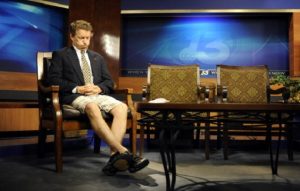The coronavirus pandemic is going to throw a wrench into the world economy and our current way of life. Governments are banning social gatherings and shutting down certain businesses in the name of public safety. Everyone is practicing social distancing. Businesses are adapting by allowing some employees to work from home, reducing hours and laying off others. Despite those mitigation efforts, many of the forecasts are that infection rates will increase. Some of the infected will become seriously ill which means that they and their families will be burdened with high medical costs and lost earnings. It will only be a matter of time before someone you know is infected by the novel coronavirus. You might be infected. We must all be prepared.
Thankfully, the government is acting. The Federal Reserve reduced the interest rate to an all-time low. Congress is quickly working on a relief bill that would provide sick leave, emergency loans and free coronavirus testing. President Donald Trump announced that federal student loan interest accrual will be halted. And Treasury Secretary Steven Mnuchin said that tax payments can be delayed for up to 90 days although the filing deadline has remained the same.
Can anything be done to improve your position during this crisis? Should you pay off your federal loans and switch to a private loan with lower interest rates? Or should you try to make the most of it by investing or purchasing a house? Or just wait and see what happens? Of course, everyone has their own goals and levels of risk tolerance so it’s hard to give a one-size-fits-all approach. Instead, I would like to offer a few things to think about.
First, and most importantly, do what you can to stay healthy. Avoid activities that can expose you to the coronavirus. The ROI on your ETFs means little in the ICU. Make sure your health insurance premiums are paid up and have a fund ready to pay any co-pays and deductibles in case the worst happens. Start a tax-deductible health savings account if you have a high-deductible plan.
Second, prepare yourself for a layoff. Lawyers are not likely to be laid off immediately but if the recession continues for a prolonged period of time, the chances are higher. Understand your state’s unemployment benefit rules and how to qualify for them, particularly constructive dismissal and wrongful termination laws. Save money to prepare to pay upcoming bills. While it is nice of you to purchase gift certificates for your favorite local restaurant or give a large tip, remember to put on your oxygen mask before helping others put on theirs.
Speaking of unemployment benefits, while it is common knowledge that self-employed people are not eligible, there might be a way around it. For example, in California and some other states, a shareholder of a corporation who is also an officer-employee can be laid off by the corporation and still qualify for unemployment and disability benefits. However, the amount of the benefit will depend on his W-2 salary from the corporation. Those who lowballed their salary will be stuck with lower unemployment benefits. That information could be useful for clients who are restaurant or fitness gym owners whose businesses were forcibly closed by the government.
Third, consider the pros and cons of refinancing out of your federal student loans. While the lower interest rates of private student loans might tempt you to ditch your federal loans with the 6.8% interest rate, remember what you are giving up. Private loans generally do not have income-based repayment plans in case you get laid off or fall on hard times. And private lenders don’t have a PSLF program since they couldn’t care less if you spent 10 years helping the indigent. They may work with you in the short run through forbearances or an altered payment plan, but in the long run, they want to get paid. And they will not qualify for any interest or payment relief proposals currently in the works.
Speaking of which, President Trump only mentioned an interest accrual halt on existing federal student loans. He did not mention payment relief. So while you will have to continue making your current payments, at least it will pay down the principal faster. This will be most beneficial to those who plan to pay off their loans although refinancing might be an alternative option. For those on IBR plans paying $100 per month on a $400,000 student loan bill until forgiveness, stopping interest won’t help them much. Considering the dire economic circumstances, payment relief would be more appropriate.
Fourth, during your self-quarantine, look for state and local relief efforts that you can take advantage of. For example, New York is suspending state debt collection –- including student loan and medical bills -– owed to the state. California will extend tax-return filing and payment deadlines.
And last, should you invest or buy a house? Honestly, I don’t know. I’m not a financial advisor nor can I predict the future. You might have some hot stock tips (my email is below) or see a house that is just right for you. If you saved a nest egg during the economic boom and see a deal on a house, then it might be a good idea to make an offer. A diversified index fund might be a good place to put your money. Or you should max out your 401(k). Or you can take a shot at buying Blue Apron stock hoping it will make a comeback since fewer people will be eating out. All I can say is don’t invest with your rent money or your emergency medical fund.
In these chaotic times, we should be prepared to weather the storm. But the uncertainty could provide opportunities to improve our financial position in the long run. Personally, I think it is best to wait and see. Governments are trying to figure out what to do and the market is trying to adjust. Making a rushed decision is a gamble and can be a major financial mistake. But keep an eye on what’s going on and act accordingly. And in the meantime, stay healthy.
Steven Chung is a tax attorney in Los Angeles, California. He helps people with basic tax planning and resolve tax disputes. He is also sympathetic to people with large student loans. He can be reached via email at sachimalbe@excite.com. Or you can connect with him on Twitter (@stevenchung) and connect with him on LinkedIn.
 Kathryn Rubino is a Senior Editor at Above the Law, and host of The Jabot podcast. AtL tipsters are the best, so please connect with her. Feel free to email her with any tips, questions, or comments and follow her on Twitter (@Kathryn1).
Kathryn Rubino is a Senior Editor at Above the Law, and host of The Jabot podcast. AtL tipsters are the best, so please connect with her. Feel free to email her with any tips, questions, or comments and follow her on Twitter (@Kathryn1).











 Jordan Rothman is a partner of
Jordan Rothman is a partner of 




